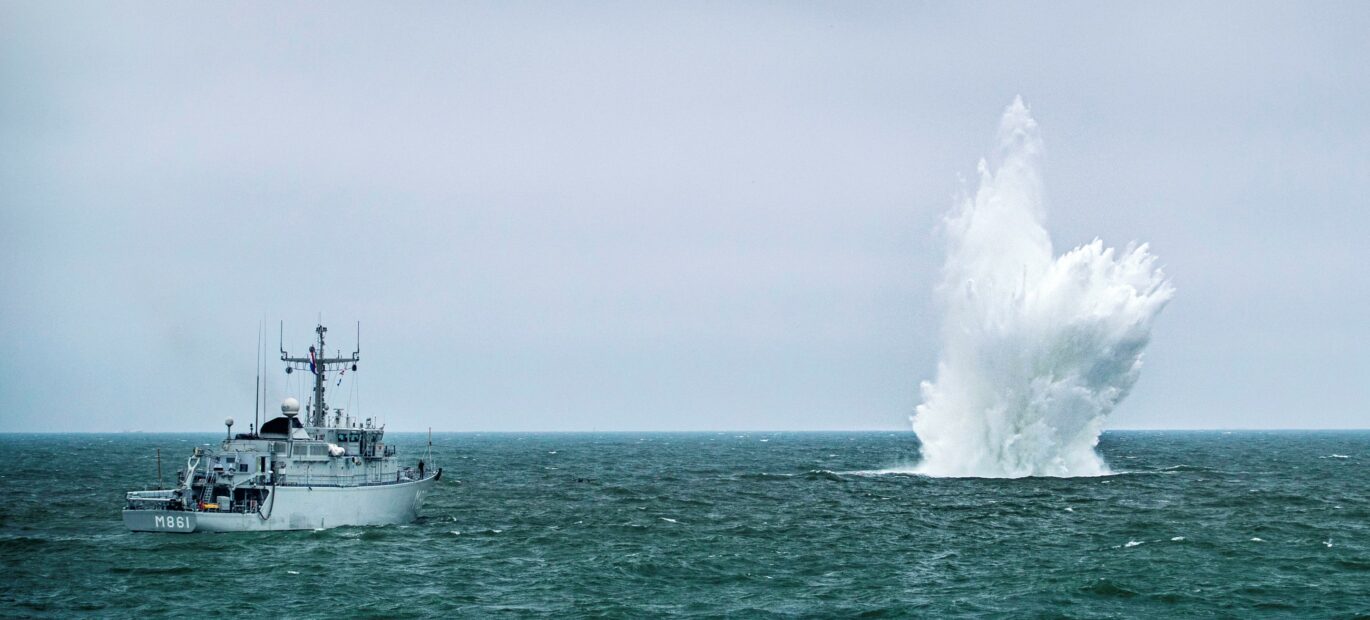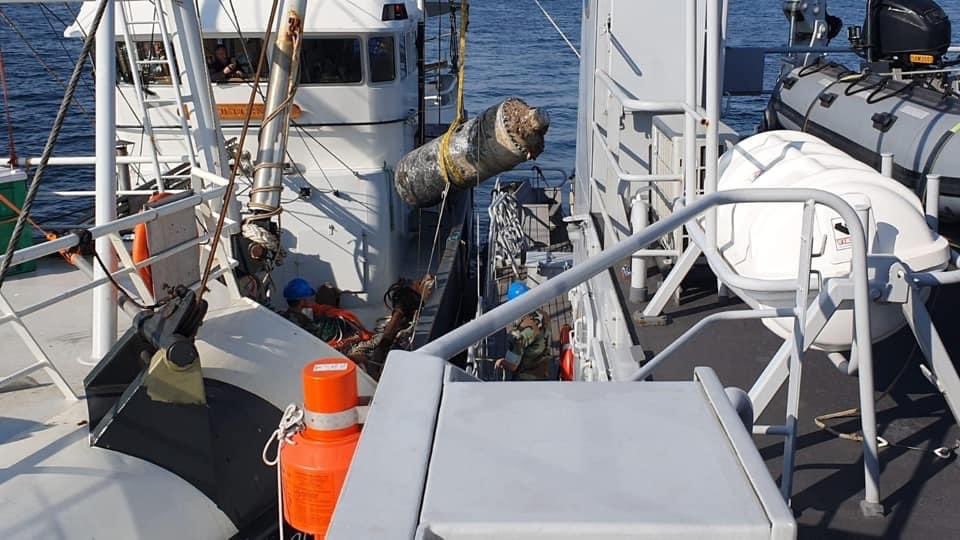Explosives
The consequences of the Second World War are still being felt at sea. Explosives from this period are spread across the North Sea. These are regularly recovered. This must be reported to the Coastguard. The Defence Organisation will then make sure that the explosives are destroyed.
Download Unexploded Ordnance (UXO) map
Danger
There are still all kinds of munitions from the Second World War on the seabed. These include mines, aircraft bombs, torpedoes, grenades, mortars and depth charges. If fishermen or work vessels unexpectedly haul up explosives at sea, this is a danger to the crew and the ship. Due to their prolonged stay on the sea floor, these explosives are unstable and dangerous.
Take safety measures if you find a possible explosive
Take the following safety measures if you haul up an explosive from the sea when, for example, fishing or dredging:
- Place the explosive as carefully as possible on board while making sure that it does not hit anything, and fasten it.
- Do not move it again, and avoid shocks that might activate the detonator.
- Keep the explosive wet, cover it with a sail, prevent an increase in heat and minimise vibration while waiting for the maritime explosives experts to arrive.
- Do not smoke and avoid open fire near the explosive.
- Do not let anyone disassemble the explosive or parts of it themselves.
- Contact the Coastguard immediately.
These measures lower the risks for the ship and the crew. It is prohibited by law to enter a port with explosives without permission from the authorities, so always notify the Coastguard.

Report an explosive or a possible explosive
The following information is important to pass on to the Coastguard:
- Vessel nationality, ship’s name, fishing mark and radio call sign.
- Geographical position of the explosive you have recovered.
- Clear description of the explosive, such as its shape, size and special characteristics (use the Unexploded Ordnance (UXO) map as an aid and state the type of explosive and its identification number).
- Safety measures you have taken yourself.
- Current location of the explosive (for example on deck, or under water).
- Intended port of call and estimated time of arrival.
- Digital photos as far as possible.
Do not throw explosives back into the sea
Explosives should not be thrown back into the sea. In addition to posing risks to the ship and its crew, this increases the risk of explosion for others if they would again touch the explosive. Throwing explosives back into the sea may only be done in consultation with the Coastguard and personnel of the Defence Explosive Ordnance Disposal Service (EODD).
If you are allowed to throw the explosive back into the sea
If this is allowed, make sure to tie a sonar buoy before the possible explosive is jettisoned. Fishing corporations issue sonar buoys for free. Without the sonar buoy, it is virtually impossible to recover the explosive due to the mostly sandy soil conditions and tides. Movements on the seabed may make the explosives easily disappear under the sand again. The Defence Organisation has sonar equipment and can find and neutralise the explosive thanks to your buoy.
Payment
You will receive compensation for retrieving an explosive, as laid down in the ‘Contribution-based scheme for retrieved explosives’. This amounts to €181.51 gross. If you detect multiple explosives in the same week, you will receive €45.38 gross for each of these explosives. You will receive a maximum of €2,268.90 per year per ship. The Directorate-General for Public Works and Water Management will pay you the amounts mentioned. There are a number of criteria on which the Coastguard determines whether you are eligible for compensation:
- You are in the Dutch fishing zone.
- You are located outside a Ministry of Defence ammunition dump or training area.
- You are on a Dutch registered fishing vessel, or on a fishing vessel registered in the European Union that is allowed to fish in the Dutch fishing zone.
- You retrieved an explosive from the First or Second World War which is on deck.
- You immediately contacted the Coastguard.
- You give the Defence Organisation the opportunity to take over the explosive from you or to neutralise it on location.
- You follow any instructions from the Coastguard and the Defence Organisation.
Coastguard Contact Details
Emergency number: 0900-0111
Operational number: +31: (0)88 958 4000
Radio: Permanent listening duty on VHF channel 16
DSC: VHF channel 70 and MF 2187.5 kHz
MMSI number: 002442000
SAR Call Sign: Den Helder Rescue